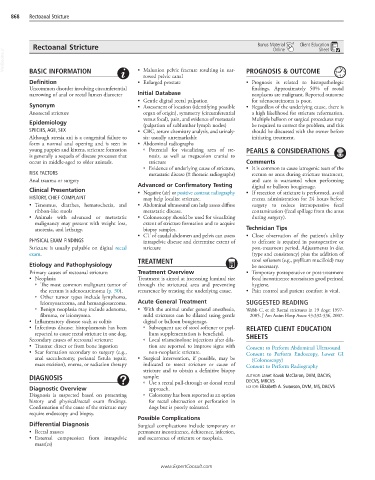Page 1727 - Cote clinical veterinary advisor dogs and cats 4th
P. 1727
868 Rectoanal Stricture
Rectoanal Stricture Bonus Material Client Education
Sheet
Online
VetBooks.ir
• Malunion pelvic fracture resulting in nar-
BASIC INFORMATION
rowed pelvic canal PROGNOSIS & OUTCOME
Definition • Enlarged prostate • Prognosis is related to histopathologic
Uncommon disorder involving circumferential findings. Approximately 50% of rectal
narrowing of anal or rectal lumen diameter Initial Database neoplasms are malignant. Reported outcome
• Gentle digital rectal palpation for adenocarcinoma is poor.
Synonym • Assessment of location (identifying possible • Regardless of the underlying cause, there is
Anorectal stricture organ of origin), symmetry (circumferential a high likelihood for stricture reformation.
versus focal), pain, and evidence of metastasis Multiple balloon or surgical procedures may
Epidemiology (palpation of sublumbar lymph nodes) be required to correct the problem, and this
SPECIES, AGE, SEX • CBC, serum chemistry analysis, and urinaly- should be discussed with the owner before
Although atresia ani is a congenital failure to sis: usually unremarkable initiating treatment.
form a normal anal opening and is seen in • Abdominal radiographs
young puppies and kittens, stricture formation ○ Potential for visualizing area of ste- PEARLS & CONSIDERATIONS
is generally a sequela of disease processes that nosis, as well as megacolon cranial to
occur in middle-aged to older animals. stricture Comments
○ Evidence of underlying cause of stricture, • It is common to cause iatrogenic tears of the
RISK FACTORS metastatic disease (± thoracic radiographs) rectum or anus during stricture treatment,
Anal trauma or surgery and care is warranted when performing
Advanced or Confirmatory Testing digital or balloon bougienage.
Clinical Presentation • Negative (air) or positive contrast radiography • If resection of stricture is performed, avoid
HISTORY, CHIEF COMPLAINT may help localize stricture. enema administration for 24 hours before
• Tenesmus, diarrhea, hematochezia, and • Abdominal ultrasound can help assess diffuse surgery to reduce intraoperative fecal
ribbon-like stools metastatic disease. contamination (fecal spillage from the anus
• Animals with advanced or metastatic • Colonoscopy should be used for visualizing during surgery).
malignancy may present with weight loss, extent of stricture formation and to acquire
anorexia, and lethargy. biopsy samples. Technician Tips
• CT of caudal abdomen and pelvis can assess • Close observation of the patient’s ability
PHYSICAL EXAM FINDINGS intrapelvic disease and determine extent of to defecate is required in postoperative or
Stricture is usually palpable on digital rectal stricture post-treatment period. Adjustments in diet
exam. (type and consistency) plus the addition of
TREATMENT stool softeners (e.g., psyllium mucilloid) may
Etiology and Pathophysiology be necessary.
Primary causes of rectoanal stricture: Treatment Overview • Temporary postoperative or post-treatment
• Neoplasia Treatment is aimed at increasing luminal size fecal incontinence necessitates good perineal
○ The most common malignant tumor of through the strictured area and preventing hygiene.
the rectum is adenocarcinoma (p. 30). recurrence by treating the underlying cause. • Pain control and patient comfort is vital.
○ Other tumor types include lymphoma,
leiomyosarcoma, and hemangiosarcoma. Acute General Treatment SUGGESTED READING
○ Benign neoplasia may include adenoma, • With the animal under general anesthesia, Webb C, et al: Rectal strictures in 19 dogs: 1997-
fibroma, or leiomyoma. mild strictures can be dilated using gentle 2005. J Am Anim Hosp Assoc 43:332-336, 2007.
• Inflammatory disease such as colitis digital or balloon bougienage.
• Infectious disease: histoplasmosis has been ○ Subsequent use of stool softener or psyl- RELATED CLIENT EDUCATION
reported to cause rectal stricture in one dog. lium supplementation is beneficial.
Secondary causes of rectoanal stricture: ○ Local triamcinolone injections after dila- SHEETS
• Trauma: direct or from bone ingestion tion are reported to improve signs with Consent to Perform Abdominal Ultrasound
• Scar formation secondary to surgery (e.g., non-neoplastic stricture. Consent to Perform Endoscopy, Lower GI
anal sacculectomy, perianal fistula repair, • Surgical intervention, if possible, may be (Colonoscopy)
mass excision), enema, or radiation therapy indicated to resect stricture or cause of Consent to Perform Radiography
stricture and to obtain a definitive biopsy
DIAGNOSIS sample: AUTHOR: Janet Kovak McClaran, DVM, DACVS,
○ Use a rectal pull-through or dorsal rectal DECVS, MRCVS
Diagnostic Overview approach. EDITOR: Elizabeth A. Swanson, DVM, MS, DACVS
Diagnosis is suspected based on presenting ○ Colostomy has been reported as an option
history and physical/rectal exam findings. for rectal obstruction or perforation in
Confirmation of the cause of the stricture may dogs but is poorly tolerated.
require endoscopy and biopsy.
Possible Complications
Differential Diagnosis Surgical complications include temporary or
• Rectal masses permanent incontinence, dehiscence, infection,
• External compression from intrapelvic and recurrence of stricture or neoplasia.
mass(es)
www.ExpertConsult.com

